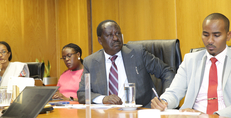Securing a Sustainable Africa Bioenergy Sector

by: Angel Navuri
The African Energy Commission (AFREC) concluded its workshop deliberations on bioenergy monitoring and reporting in Africa calling for accurate, effective and reliable data required for sound bioenergy policy and decisions making in Africa.
Organised by the African energy Commission (AFREC), the three-day workshop which took place recently attended by more than 140 delegates from 41 AU member state’s ministry of energy discussed the impacts and challenges phased by AU member states in bioenergy data collection, validation and dissemination.
The workshop brought together international players in energy data and statistics such as the United Nations Economic Commission for Africa (UNECA), the African Union Development Agency (AUDA-NEPAD), International Energy Agency (IEA), United Nations Environmental Programmes (UNEP), United Nations Statistics Division (UNSD), the Food and Agriculture Organisation (FAO), the International Renewable Energy Agency (IRENA)), to deliberate on howto improve, analyse current and possible interventions for effectively tracking biomass production and consumption for African countries.
The forum also provided a platform to understand the magnitude and identify real-time issues related to biomass end-use and availability. In his official opening address, Mr Rashid Ali Abdallah, Executive Director of AFREC stated that biomass is an essential energy source in both household and industry.
About two third of African countries depend on biomass with more than 50% of biomass for their total final energy consumption. One third of African countries even depends on it for more than 80% and a few countries for over 90%. In some countries, the share of biomass consumption in residential sector accounts for over 80-95%.
‘‘For Africa to develop sustainable bioenergy projects and develop the sector, Africa needs to resolve the persistent challenge of data quality, availability and the impact of biomass consumption exerted on health and environment amongst others.
Hence, this workshop will help AFREC to identify viable robust tools and synergies, which AFREC can develop with the member states and enable us to provide accurate measurements of biomass data across the continent.
Outcomes from this workshop will also enable us to develop a realistic short-to medium-and-long term strategy for creating a viable bioenergy programme framework for Africa, aimed at improving monitoring, reporting and sustainability of bioenergy resources in all AU Member States,’’ he stressed.
IEA Head of Statistic Division, Mr. Nick Johnstone noted that bioenergy accounts for one tenth of the overall world energy supply and half of the Africa demand of the energy is met by bioenergy.
‘‘It is of outmost important that we track and report good bioenergy data for policy making to guarantee that we ensure clean cooking, energy access generally, proper regulations and so much more. Hence, active cooperation and engagement are fundamental to meet the objectives of developing the energy sector,’’ he underlined.
Ms. Agnieszka Kscielniak, a statistician from the UNSD, speaking on behalf of Mr Leonardo Souza, Chief Energy Statistics said, ‘‘the continuous over reliance on biomass and unhealthy cooking stoves in Africa undermines the gains made in many African countries because of the severe health impacts it poses, it limits economic growth and social progress.
Data for traditional solid biomass are generally scarce, hindering evidence based policy making, monitoring and evaluation of programmes which are designed for other energy issues, and hence, it is essential to build capacity for monitoring and reporting of such energy use.’’
Speaking on behalf of Acting Director for Infrastructure and Energy of the African Union Commission (AUC), Mr Moses Bayingana noted that the bioenergy workshop is relevant to the AU Member states and Regional Economic Communities, in the development of sustainable and modern energy access on the continent because, update and accurate data accessibility in bioenergy provide opportunities to move away from the traditional consumption patterns of biomass, and ensure that the biomass resources are efficiently utilised by deploying improve technology for direct compassion.
The workshop builds on the outcomes of the 8th bioenergy week, which was organized jointly by AFREC, UNECA and FAO in March 2021, as AFREC commit to build synergies with other international and development partners in transforming the Africa energy sector and strengthening its mandate including being the official energy data hub for Africa as entrusted by the African member states. Delegates from Member states, regional and international institutions shared their experiences, challenges and good practices in bioenergy consumption, resources, health and socio-economic data management.
The meeting also reflected on how to translate bioenergy data and their analysis into actions, measure, and policy to improve the life of group using biomass for cooking. Participants also provided valuable inputs into the draft strategic framework for bioenergy data management in Africa currently being developed by AFREC.
The Framework encompasses all aspects of bioenergy data management including collection, processing, analysis, validation, use of data and their dissemination in a sustainable manner.
Source:AU



